The
Plague began in Wuhan, China, back in December, and really took hold
in January. Travelers from Wuhan brought it to many other places
while Chinese officials hid the truth. Actually we don't know the
truth, though it is most likely that it started from human contact with a bat
purchased in the large wild foods "wet" market in Wuhan.
Some say that it is a product of biological warfare that the Chinese
unleashed accidentally. Emotions are riding high.
Plague.
Chinese virus. One a huge overreaching metaphor, the other more
biting and overtly racist than the "Asian flu" of my
generation. We have not suffered a true pandemic in this country
since the 1918 flu epidemic (that one "Spanish"). We never
had Plague, though the US government laced blankets given to
unsuspecting Native Americans with smallpox, which proved far more
deadly than Covid-19. This particular corona virus is much more
dangerous than the flu, with a death rate roughly ten times worse,
but it is nowhere near the lethal rate of the Plague, which kills
from 50 to 100% of those afflicted, depending upon the type. But the
analogy is apt in one respect. COVID-19 is just as contagious as any
Plague was the first time it entered a population, since there is and
was no immunity at the virgin viral stage. But the death rate is
much lower, somewhere between .5% and 2.5%, much higher among at-risk
populations: the elderly and those with pre-existing conditions. For
some reason, it is even higher among Italians, who have suffered
almost a 10% death rate, far higher than in Wuhan, Iran, or the US.
But
the psychological parallels to societies beset by the Plague are
many. I live in a highly-educated progressive community clustered
around a land trust governed by consensus that includes a sizable
Quaker Meeting. But once the Plague arrived, fear has spread among
us, just like everywhere else. We do not not know if the virus is
loose amongt us, but rumors are flying, and friendships have been
damaged. Many fingers have been pointed at a communal house where
polyamory is preached and the dominant ethos is to say Yes! to
everything. One young man who shares their ethos (but does not live
there) made the unassailable point, "Disease is purposeful."
The implication is we need to say yes to pandemics, which definitely
have a purpose.
What
fascinates—and perplexes—me is that folks are motivated to change
their lives, in some cases, move more fundamentally towards changing
the polity, to a degree that the climate emergency has not achieved.
Some have embraced this crisis, and calling it a plague raises the
stakes as a way of motivating themselves and society at large to
radically alter the way we conduct our lives. As for the climate,
shutting down the world economy has meant a sharp drop in carbon
emissions, which is what happened in 2009. But when the economy
roared back, so did the emissions - worse than ever. Unfortunately,
this will happen again and again until groupthink (as opposed to
progressive think-tanks) mutates into long-range planning mode. But
as long as this is frontal lobe activity, rather than lymphatic and
brainstem, which it is by its very nature, we seem to be stuck with
Darwinian capitalism until the final crash.
The
Climate Emergency project, of which I am a member, likens the climate
crisis to a world war, requiring extraordinary focus on national and
international readiness to combat it. President Trump has sneered at
the cowardly weaklings who imagine that climate change is real,
calling it a Chinese or Democrats' plot. The very thought of using
the wartime analogy for climate change is ludicrous to him. But now,
seeing many advantages in the analogy in an election-year pandemic,
he is calling himself a "wartime president." The irony is
massive.
II.
Social distancing
In
this country, it took awhile for new public health protocols to take
hold. The
President was initially in denial, and has frequently waffled ever
since. He contradicts his public health officials, and when he
announced the new CDC recommendation last week advising citizens to
wear masks, he immediately undercut the recommendation, saying he
wasn't planning to. Federal
government agencies have spoken and acted at cross purposes, and,
without strong central government direction like China and France
have had, it has devolved to the states to make their own way, often
competing for scarce equipment like N-95 masks and ventilators.
Until
a vaccine and/or a simple, effective antibody test is developed,
social distancing is our best, only hope to slow the progress of a
potentially virulent pandemic. After a slow start, almost all of the
folks in my crowd—the
educated blue elite in Greater Celo—have
adopted it strictly, along with masks and gloves, when the occasion
warrants. Fortunately, it's spring, and we live far apart from each
other in theis rural valley.
But though I spent the first
three weeks of lockdown living alone, I still saw friends often, out
walking, or working in the community garden, often with one or two
cohorts. NC state parks and
forests are closed, but on
public trails along the Blue Ridge Parkway, most people distance
carefully when they meet someone coming the other way.


